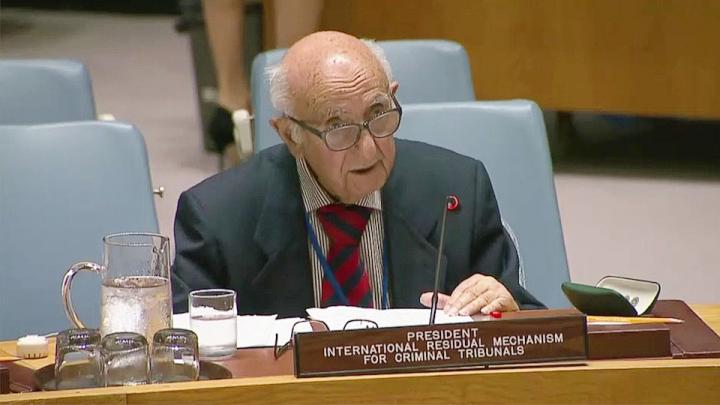President Meron briefs UN Security Council on progress of work

The President of the International Residual Mechanism for Criminal Tribunals (Mechanism), Judge Theodor Meron, today presented the latest six-month report to the United Nations Security Council (Council), highlighting the most notable developments in the Mechanism’s work.
In his remarks, President Meron stated that for the first time since its establishment, the Mechanism is operating without the support of its two predecessor Tribunals, following the historic closure of the International Criminal Tribunal for the former Yugoslavia (ICTY) at the end of last year, and that the Mechanism has thus assumed the full scope of the Tribunals’ residual functions.
Underlining the Mechanism’s ongoing period of heightened judicial activity, the President noted the “unprecedented and unexpected challenges” related to the resource constraints under which the Mechanism has been operating since the beginning of this year, and expressed his gratitude to the Mechanism’s Registrar, Mr. Olufemi Elias, and his team for their perseverance under challenging circumstances.
Turning to important milestones, President Meron emphasized the adoption in April of a revision to the Code of Professional Conduct for the Judges of the Mechanism, by which the Judges may be held accountable for upholding the principles set forth therein. The President underscored this development as another example of “the Mechanism’s commitment to best practice and to serving as a model for accountability in all respects”.
With respect to the Mechanism’s judicial activities, President Meron noted that the appeal hearing in the Šešelj case took place on 13 December 2017 and that the appeal judgement in that case was rendered on 11 April 2018. The President further noted that the appeal hearing in the Karadžić case took place on 23 and 24 April, ahead of projections, and that it is the aim to conclude this case by December 2018, significantly earlier than previously forecast. The President also reported good progress in other ongoing cases, including in the retrial in Stanišić and Simatović case and in the ongoing appeal proceedings in the Mladić case, noting that both parties filed their notices of appeal in the latter case. In the Ngirabatware case, the President advised that the review hearing is expected to take place in the second half of this year.
The President further informed the Council that the Mechanism transferred eight convicted persons from the UN Detention Facility in Arusha to enforcement States during the reporting period, including four individuals to Senegal and four to Benin. The President stated that the Mechanism aims to complete the transfer of all convicted persons under the Mechanism’s jurisdiction in Arusha and in The Hague within this year, expressing his appreciation to Member States for their vital support in this effort.
President Meron also briefed the Council on important milestones in the area of archives management, including the final substantial handover of physical and digital records from the ICTY to the Mechanism, and the relocation of the physical records of the International Criminal Tribunal for Rwanda to the Mechanism’s custom-built facility in Arusha. Recalling the Council’s guidance in resolution 1966 on the establishment of information and documentation centres in the former Yugoslavia, the President informed about the Mechanism’s assistance in the recent launch of the Sarajevo Information Centre on the ICTY, and the Mechanism’s intent to support similar initiatives in the near future.
In closing, the President reflected on the joint commitment to ensure the success of international justice and a global culture of accountability, by remarking: “It will only be possible if we remain open to improvement, innovation and creative problem-solving […] and continue to work together, maintaining an unerring focus on the core principles underlying not just the Mechanism’s establishment but the work of the United Nations more generally”.